

Herbal Oil: Bay Oil Benefits and Uses. Since its discovery in the 20th century, bay rum has been used as a tonic to treat muscle problems.
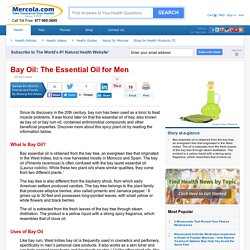
It was found later on that the essential oil of bay, also known as bay oil or bay rum oil, contained antimicrobial compounds and other beneficial properties. Discover more about this spicy plant oil by reading the information below. What Is Bay Oil? Bay essential oil is obtained from the bay tree, an evergreen tree that originated in the West Indies, but is now harvested mostly in Morocco and Spain. Herbal Oil: Vanilla Oil Benefits and Uses. Beyond its fantastic aroma and delicious flavor, vanilla oil boasts of a variety of health-promoting properties.

Read on to learn more about my recommendations regarding this sweet-smelling essential oil. What Is Vanilla Oil? Vanilla oil is derived from Vanilla planifolia, a native species of the Orchidaceae family, with large climbing vines and clusters of yellow-green flowers that turn into fragrant brown-colored pods. The word "vanilla" comes from the Spanish word "vainilla," which means little black pod.1 Vanilla is indigenous to Central America and Mexico, but has been widely grown in the subtropics of Asia, Northern Europe and Canada. Madagascar is the largest producer of vanilla in the world.
Looking for pure vanilla oil in the market can be very time-consuming and oftentimes confusing. . • Bourbon vanilla from Madagascar • Mexican vanilla from Mexico. Herbal Oil: Yarrow Oil Benefits and Uses. What Is Yarrow Oil?
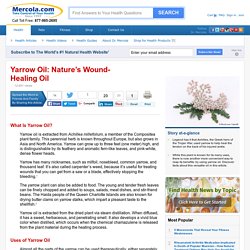
Yarrow oil is extracted from Achillea millefolium, a member of the Compositea plant family. This perennial herb is known throughout Europe, but also grows in Asia and North America. Yarrow can grow up to three feet (one meter) high, and is distinguishable by its feathery and aromatic fern-like leaves, and pink-white, dense flower heads. Yarrow has many nicknames, such as milfoil, nosebleed, common yarrow, and thousand leaf. It’s also called carpenter’s weed, because it’s useful for treating wounds that you can get from a saw or a blade, effectively stopping the bleeding.1 The yarrow plant can also be added to food.
Herbal Oil: Spruce Oil Benefits and Uses. With its narrow frame and sparse appearance, botanists consider spruce lagging behind its other conifer counterparts from the Pinacea plant family in terms of splendor.
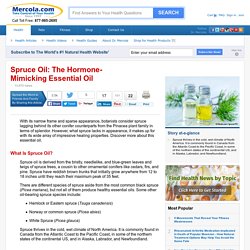
However, what spruce lacks in appearance, it makes up for with its wide array of impressive healing properties. Herbal Oil: Spearmint Oil Benefits and Uses. Peppermint oil is strong, too strong for some people.
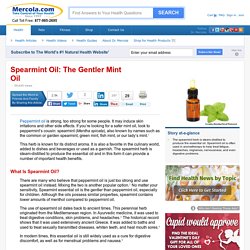
It may induce skin irritations and other side effects. If you’re looking for a safer mint oil, look to peppermint’s cousin: spearmint (Mentha spicata), also known by names such as the common or garden spearmint, green mint, fish mint, or our lady’s mint.1 This herb is known for its distinct aroma. It is also a favorite in the culinary world, added to dishes and beverages or used as a garnish. The spearmint herb is steam-distilled to produce the essential oil and in this form it can provide a number of important health benefits. Herbal Oil: Ylang Ylang Oil Benefits and Uses. What Is Ylang Ylang Oil?
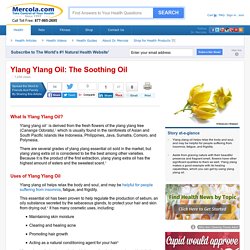
Ylang ylang oil1 is derived from the fresh flowers of the ylang ylang tree (Cananga Odorata),2 which is usually found in the rainforests of Asian and South Pacific islands like Indonesia, Philippines, Java, Sumatra, Comoro, and Polynesia. There are several grades of ylang ylang essential oil sold in the market, but ylang ylang extra oil is considered to be the best among other varieties. Because it is the product of the first extraction, ylang ylang extra oil has the highest amount of esters and the sweetest scent.3.
Herbal Oil: Thyme Oil Benefits and Uses. Superbugs like methicillin-resistant Staphylococcus aureus (MRSA) are on the rise and, unfortunately, are becoming resistant to the drugs used to treat them.
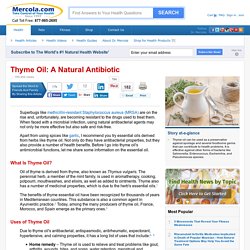
When faced with a microbial infection, using natural antibacterial agents may not only be more effective but also safe and risk-free. Apart from using spices like garlic, I recommend you try essential oils derived from herbs like thyme oil. Not only do they have antibacterial properties, but they also provide a number of health benefits. Herbal Oil: Parsley Oil Benefits and Uses. Parsley is a popular and versatile herb that adds a mild flavor to many dishes.
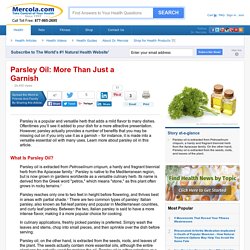
Oftentimes you’ll see it added to your dish for a more attractive presentation. However, parsley actually provides a number of benefits that you may be missing out on if you only use it as a garnish – for instance, it is made into a versatile essential oil with many uses. Learn more about parsley oil in this article. What Is Parsley Oil?
Parsley oil is extracted from Petroselinum crispum, a hardy and fragrant biennial herb from the Apiaceae family.1 Parsley is native to the Mediterranean region, but is now grown in gardens worldwide as a versatile culinary herb. Herbal Oil: Oregano Oil Benefits and Uses. Oregano, the fragrant herb commonly used to flavor pasta and meat dishes, is renowned for its versatility in the kitchen.
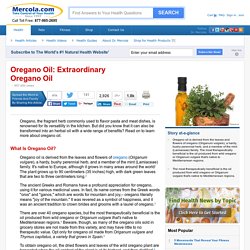
But did you know that it can also be transformed into an herbal oil with a wide range of benefits? Read on to learn more about oregano oil. What Is Oregano Oil? Oregano oil is derived from the leaves and flowers of oregano (Origanum vulgare), a hardy, bushy perennial herb, and a member of the mint (Lamiaceae) family. It's native to Europe, although it grows in many areas around the world1 The plant grows up to 90 centimeters (35 inches) high, with dark green leaves that are two to three centimeters long.2The ancient Greeks and Romans have a profound appreciation for oregano, using it for various medicinal uses. Uses of Oregano Oil I highly recommend adding oregano oil to your arsenal of natural healing tools, as it has a wide range of uses. Herbal Oil: Peppermint Oil Benefits and Uses. History shows a wide range of uses for peppermint as an essential oil, which has been used for over 200 years in ancient Rome and Egypt.

Various cultures have used this oil not only for its minty fragrance, but also to symbolize hospitality. Herbal Oil: Vetiver Oil Benefits and Uses. Herbal Oil: Geranium Oil Benefits and Uses. Anxiety is a common problem among Americans, and drugs like benzodiazepine are commonly used to treat it. Not only can these drugs cause withdrawal symptoms, but they also lead to a host of health problems that include memory loss, hip fractures, and impaired concentration, which further develop into unnecessary stress and expenses. Instead, the underlying cause of anxiety can be dealt with using natural stress management methods, like the Emotional Freedom Technique (EFT). Another method worth trying is aromatherapy. Research has shown that treating stress with essential oils is effective, plus has minimal risks involved.
If you're interested in trying this out, you can start out by using geranium oil. What Is Geranium Oil? Geranium is a perennial shrub with small pink flowers and pointy leaves that is native to South Africa.1 Out of the many varieties of the plant, Pelargonium graveolens is the source of the essential oil. Herbal Oil: Clove Bud Oil Benefits and Uses. You're probably familiar with clove, an aromatic spice that is commonly used in Indian and Chinese culture as seasoning and for medicinal purposes. Cloves, also known as clove buds, gained popularity all over the world, especially in the western hemisphere, during the 7th century because of their health benefits. Like other spices, cloves can also be used to make an essential oil. While it is not as popular as other plant oils, I believe there are numerous reasons why you should consider having clove bud oil at home. What Is Clove Bud Oil? Clove bud oil is derived from the clove tree, a member of the Myrtaceae family. Out of the three, clove bud essential oil — also known as Eugenia carophyllata — is the most popular in aromatherapy.
During the time of ancient Greeks and Romans, this plant oil was used to relieve toothaches and to combat bad breath.2 Its presence was also found in Chinese and Ayurvedic medicine with the same purpose. Herbal Oil: Cinnamon Leaf Oil Benefits and Uses. Beyond its alluring fragrance and spicy-sweet flavor, cinnamon provides many benefits for your health, such as its insulin-like effects, which can be useful for diabetics.
But did you know that you can also get many of cinnamon’s health benefits by using cinnamon leaf oil? Here are facts worth knowing about this oil. Herbal Oil: Red Cedarwood Oil Benefits and Uses. What Is Red Cedarwood Oil? Don’t be fooled by the name, but red cedarwood oil comes from a type of juniper tree (Juniperus virginiana),1 a member of the Cupressaceae or cypress family. These trees, which grow up to 30 feet tall, can be found in the US. It’s commonly known as the eastern red cedar. Herbal Oil: Neroli Oil Benefits and Uses. Did you know that it takes at least 1,000 pounds of orange blossom flowers just to make one pound of neroli oil?
1 No wonder it's the most expensive among citrus essential oils. Herbal Oil: Neroli Oil Benefits and Uses. Herbal Oil: Ginger Oil Benefits and Uses. I have discussed the benefits of ginger on my site for some time now. I am particularly impressed by its anti-inflammatory properties, which make it one of the most potent home remedies you can use to relieve pain and motion sickness.1,2 This is why it's not surprising to learn that ginger oil, extracted from fresh ginger root, also offers these whole body benefits and so much more.
Herbal Oil: German Chamomile Oil Benefits and Uses. Aside from being famous in teas, the German chamomile plant is also praised for its healing effects in various herbal applications. As a matter of fact, Germans often refer to it as "alles zutraut," which means "capable of anything. " Herbal Oil: Clary Sage Oil Benefits and Uses. A close relative of the common garden sage, the clary sage is a perennial herb that grows from May to September. Herbal Oil: Bergamot Oil Benefits and Uses. More than just offering a familiar scent or flavor, bergamot oil is bursting with a powerhouse of benefits. Find out how this sweet-smelling essential oil can work wonders for your health.
Herbal Oil: Arnica Oil Benefits and Uses. Arnica oil is becoming popular for its pain-relieving and health-promoting properties. It's a wonderful addition to your alternative first aid kit, especially if you're prone to exercise-related injuries, such as bruises or sprains. Keep on reading to learn more about arnica oil. Herbal Oil: Myrrh Oil Benefits and Uses. You may have heard of myrrh from Biblical stories, as it's one of the precious gifts (together with gold and frankincense) offered by the three wise men to the newborn Jesus. This valuable element actually has a long history of use, especially in ancient civilizations. Herbal Oil: Frankincense Oil Benefits and Uses. Frankincense has a significant meaning in Christianity, and is believed to be one of the gifts offered by the three wise men to the newborn Jesus.
Today, this fragrant resin is transformed into an essential oil that’s valued not only in religious practice, but also in aromatherapy and natural health. Read on to learn more about frankincense oil. Herbal Oil: Lavandin Oil Benefits and Uses. Even though lavandin oil comes second only to its parent plant lavender, you can certainly place it as one of the top oils in your medicine cabinet because it offers truly exceptional benefits to your health.
Read on to learn more about this essential oil. Herbal Oil: Tea Tree Oil Benefits and Uses. Practical, inexpensive, and has many uses for your health and around the home – no wonder tea tree oil is hailed as a "jack of all trades" among nature's herbal oils. Here's what you need to know about tea tree oil. Shocking Discover for ... The Fibro Wellness Peoples Body Support Supplements.